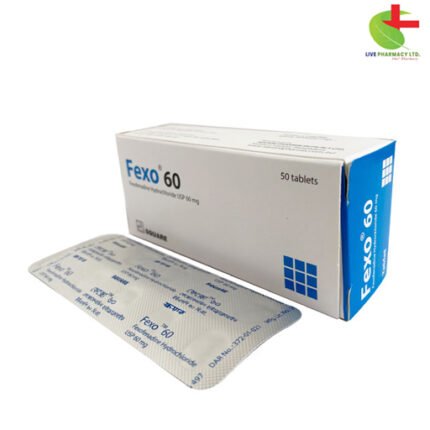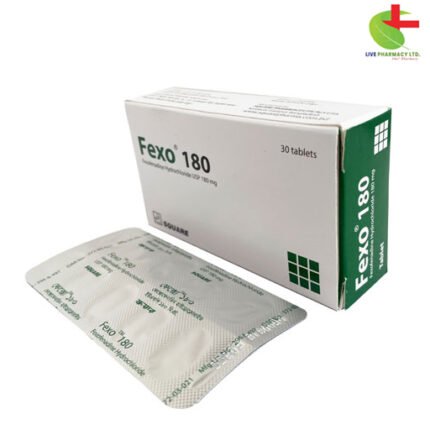Fexo 120
90.00৳ Strip
- Fexo is a trusted solution for allergic rhinitis and chronic idiopathic urticaria.
- Effective in adults and children aged 12 and above.
- Relieves symptoms like sneezing, runny nose, itching eyes/nose, and hives.
- Enhances overall quality of life and productivity.
- Potent action on the H1 histamine receptor without sedative effects.
 Brand
Brand
|
Square Pharmaceuticals PLC |
|---|---|
 Generics
Generics
|
Fexofenadine Hydrochloride |
Indications
For those experiencing allergic rhinitis, Fexo offers relief from symptoms linked to both seasonal and perennial occurrences in adults and children aged 12 and above. It effectively alleviates sneezing, runny nose, watery eyes, and itchiness in the eyes, nose, palate, and throat. Fexo not only relieves symptoms but also enhances health-related quality of life and productivity in work and daily activities.
In the case of chronic idiopathic urticaria, Fexo provides relief from associated symptoms in adults and children aged 12 and above. It significantly reduces signs and symptoms such as wheals and itching, improving overall health-related quality of life and productivity.
Pharmacology
Allergic reactions, mediated by the H1 histamine receptor, involve the release of histamine and other inflammatory mediators from mast cells and basophils upon exposure to allergens. Fexofenadine, an “inverse agonist” of the H1 receptor, binds to and stabilizes its inactive form, thereby preventing activation and subsequent inflammatory responses. With its selective affinity for H1 receptors and lack of significant CNS effects due to its inability to cross the blood-brain barrier, Fexofenadine effectively targets allergic symptoms without sedative or other adverse effects.
Dosage & Administration For allergic rhinitis
- Adults and children aged 12 and above: 60 mg twice daily, or 120 mg once daily, or 180 mg once daily. Adjustments may be needed for impaired renal function.
- Children aged 6 to 11 years: 30 mg twice daily, or 60 mg once daily. Dosage adjustments may be necessary for impaired renal function.
- Children aged 2 to 11 years: Suspension: 30 mg or 5 ml twice daily. Adjustments may be required for impaired renal function.
For chronic idiopathic urticaria:
- Adults and children aged 12 and above: Same dosage regimen as allergic rhinitis. Adjustments may be needed for impaired renal function.
- Children aged 6 months to less than 2 years: Suspension: 15 mg or 2.5 ml (1/2 tsp) twice daily. Adjustments may be necessary for impaired renal function.
- Children aged 2 to 11 years: Suspension: 30 mg or 5 ml (1 tsp) twice daily. Adjustments may be required for impaired renal function.
- Follow physician’s advice for medication.
Interaction
Fexo does not undergo hepatic biotransformation and therefore does not interact with other medicinal products via hepatic mechanisms. However, coadministration with erythromycin or ketoconazole may increase plasma levels of fexofenadine without significant adverse effects. No interaction was observed between fexofenadine and omeprazole, but administration with antacids containing aluminum and magnesium hydroxide may reduce bioavailability, necessitating a time gap between administrations.
Contraindications
Fexofenadine Hydrochloride is contraindicated in individuals with known hypersensitivity to it or any of its components.
Side Effects
Common adverse effects reported in adults include headache, drowsiness, dizziness, and nausea. Post-marketing surveillance revealed hypersensitivity reactions, insomnia, nervousness, tachycardia, diarrhea, rash, urticaria, and pruritus.
Pregnancy & Lactation
Limited data are available on Fexofenadine hydrochloride use during pregnancy and lactation. Caution is advised, and its use is recommended only if clearly necessary.
Precautions & Warnings
Special care is needed when administering Fexo to older adults and those with renal or hepatic impairment. Patients with cardiovascular disease should be informed about potential adverse reactions such as tachycardia and palpitations. Fexo tablets are unlikely to affect the ability to drive or operate machinery, but individual responses should be assessed before engaging in such activities.
Use in Special Populations
Renal or hepatically impaired patients may require dosage adjustments. Although adverse events were similar in elderly patients compared to younger ones, pharmacokinetics may be altered in the elderly.
Overdose Effects
Symptoms of overdose include dizziness, drowsiness, fatigue, and dry mouth. Standard measures should be taken for removal of unabsorbed medication, and symptomatic and supportive treatment is recommended. Hemodialysis is ineffective in removing Fexo from the blood.
Therapeutic Class
Fexo belongs to the class of non-sedating antihistamines.
Storage Conditions
Store Fexo in a cool, dry place away from light and heat, and keep it out of reach of children.
Chemical Structure
Fexofenadine Hydrochloride has the molecular formula C32H39NO4.
Common Questions about Fexo 120 mg Tablet
Q: What is Fexo 120 mg Tablet? A: Fexo 120 mg Tablet is an antihistamine that works by blocking histamine, which the body produces during an allergic reaction.
Q: What are the uses of Fexo 120 mg Tablet? A: Fexo 120 mg Tablet is used to treat allergic rhinitis and urticaria, providing relief from symptoms such as runny nose, itching eyes/nose, sneezing, hives, and itching.
Q: What are the Side Effects of Fexo 120 mg Tablet? A: Reported side effects include vomiting, headache, coughing, diarrhea, painful menstruation, pain in the arms and legs, hives, redness of the skin, and swelling of the face, lips, eyelids, tongue, hands, and feet.
Q: What are the instructions for storage and disposal of Fexo 120 mg Tablet? A: Store Fexo 120 mg Tablet in a cool, dry place in its original packaging, out of reach of children and pets.
Q: Can Fexo 120 mg Tablet make you sleepy? A: Yes, sleepiness is a common side effect of Fexo 120 mg Tablet.
Q: Can you overdose on Fexo 120 mg Tablet? A: Avoid overdosing on Fexo 120 mg Tablet as it can cause adverse reactions and increase the risk of side effects such as dizziness, drowsiness, fatigue, and dry mouth.
Q: How quickly does Fexo 120 mg Tablet work? A: Fexo 120 mg Tablet starts working within 1 hour of consumption, with peak benefits observed within 6 hours.
Q: Does Fexo 120 mg Tablet relieve symptoms of outdoor and indoor allergies? A: Yes, Fexo 120 mg Tablet can relieve symptoms caused by outdoor and indoor allergens, including upper respiratory allergies, hay fever, watery eyes, runny nose, and itching of the nose or throat.
Q: How to cope with dizziness caused by Fexo 120 mg Tablet? A: Rest after taking Fexo 120 mg Tablet if feeling dizzy or sleepy. Avoid using heavy machinery or driving and move slowly. If extreme dizziness occurs, consult a doctor promptly.
Q: Can I take antacids while taking Fexo 120 mg Tablet? A: Avoid combining Fexo 120 mg Tablet with antacids as it may decrease its absorption.
Q: How should I take Fexo 120 mg Tablet? A: Take Fexo 120 mg Tablet as prescribed by the doctor, avoiding overdosage.
Q: Is there any food or drink that I need to avoid while taking Fexo 120 mg Tablet? A: Avoid consuming grapefruit, orange, or apple juice while taking Fexo 120 mg Tablet.
Q: Can Fexo 120 mg Tablet cause heart problems? A: Exercise caution and seek alternatives if you suffer from heart disorders.
Quick Tips
- Fexo 120 mg Tablet is an antihistamine that treats allergy symptoms by blocking the effects of histamine in the body.
- It is less likely to cause drowsiness compared to similar medicines.
- Avoid consuming fruit juices like grapefruit, orange, or apple as they may decrease the effectiveness of Fexo 120 mg Tablet.
- Stick to simple meals to alleviate nausea caused by Fexo 120 mg Tablet.
- Avoid using antacids before or after taking Fexo 120 mg Tablet as they may interfere with its absorption.













Reviews
There are no reviews yet.